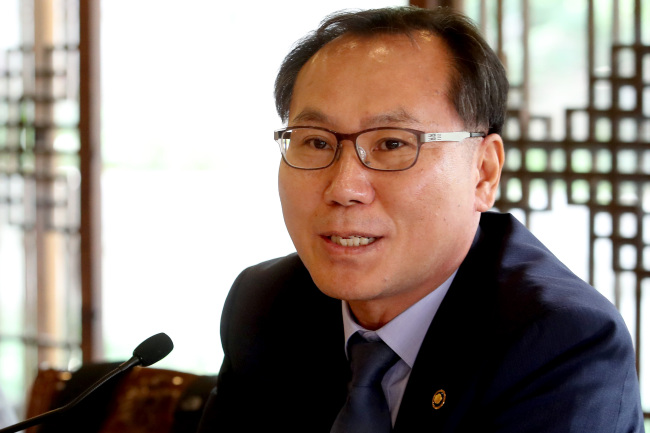New cultural heritage chief vows ‘attitude overhaul’
By Yoon Min-sikPublished : Aug. 31, 2017 - 16:49
Kim Jong-jin, the recently-named head of Cultural Heritage Administration, emphasized the importance of preserving cultural heritage and vowed changes in the CHA employees‘ attitude in achieving the goals of the organization.
Kim who has been with CHA since 2001, however, stopped short of suggesting specific plans for revamping the system that has been criticized for lacking expertise, resulting in such fiascos as the recent “fake royal seal” controversy.
Kim who has been with CHA since 2001, however, stopped short of suggesting specific plans for revamping the system that has been criticized for lacking expertise, resulting in such fiascos as the recent “fake royal seal” controversy.

Meeting with reporters on Thursday, Kim said his priority now is on cooperating with experts and regional governments on discovering and preserving cultural heritage.
“Cultural heritage has a lot of significance and stories behind it, which we should uncover and expand the scope of people who understand their importance. Secondly, we should step up efforts to probe and find artifacts and promote their values,” he said.
Kim also addressed recent hiccups for the agency, namely the controversy surrounding a royal seal of King Deokjong of Joseon.
It was recently revealed that the seal -- which was originally created in 1471 -- was a reproduced version made in 1924, when the country was under Japan’s colonial rule.
While the CHA maintains that the Deokjong seal holds identical value as the original, the controversy was fueled by revelation that the administration mistakenly thought and promoted the recently-found repatriated seal as the original.
“There was a minor error in the facts (concerning Deokjong seal), and it would’ve been great if it had been accurate from the beginning. We did try to improve, but the effort may have looked insufficient to outsiders,” Kim said.
He added that such shortcomings may have resulted in the CHA workers focusing only on repatriating the article, and being too concerned about possible international feud that may have occurred in the process.
“Administrative process should be based on professionalism, and I do believe an attitude overhaul is needed,” he said.
Kim did not specify what systemic changes will take place, or even if they will take place, saying it is too early in his tenure.
He did say the CHA has established a system to better store important documents -- all certificates related to artifacts have been mandated to be preserved in the CHA archives, rather than being kept in the department as has been the procedure.
The CHA was embarrassed last month when it was revealed to have lost the original copies of the UNESCO certificates on inscription of the Joseon Wangjo Sillok, or the Annals of the Joseon Dynasty, on UNESCO’s Memory of the World Register.
Kim also raised caution against regional government bodies pushing restoration projects of ancient culture simply to boost tourism.
Since President Moon Jae-in highlighted research on the ancient Gaya Kingdom (A.D. 42-562) as a major task, requests for Gaya-related projects have been pouring in from state-run bodies.
“Some of the regional groups lack proper understanding of Gaya culture,” he said. “The National Research Institute of Cultural Heritage will lead the related research until the first half of next year, and will evaluate (the projects’) values.”
By Yoon Min-sik
(minsikyoon@heraldcorp.com)


![[Exclusive] Korean military set to ban iPhones over 'security' concerns](http://res.heraldm.com/phpwas/restmb_idxmake.php?idx=644&simg=/content/image/2024/04/23/20240423050599_0.jpg&u=20240423183955)

![[Graphic News] 77% of young Koreans still financially dependent](http://res.heraldm.com/phpwas/restmb_idxmake.php?idx=644&simg=/content/image/2024/04/22/20240422050762_0.gif&u=)



![[Pressure points] Leggings in public: Fashion statement or social faux pas?](http://res.heraldm.com/phpwas/restmb_idxmake.php?idx=644&simg=/content/image/2024/04/23/20240423050669_0.jpg&u=)










